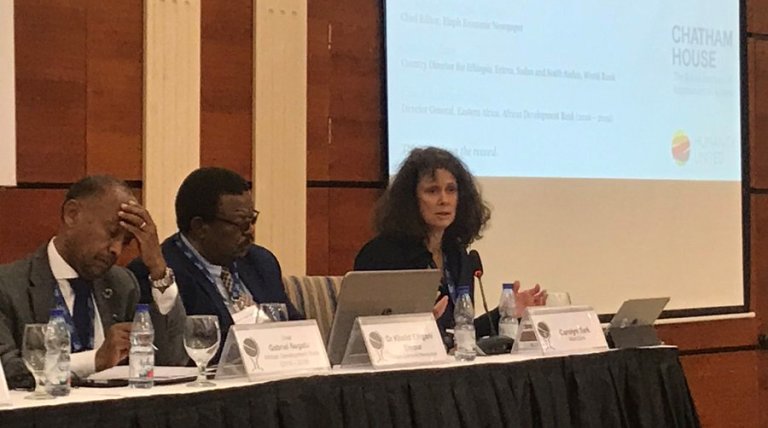Sudan has long road ahead before foreign debt relief: World Bank

October 3, 2019 (KHARTOUM) – To be eligible for foreign debt relief Sudan must first meet certain criteria to address economic problem and fighting poverty before to convince the international financial community of its economic viability, said the World Bank director for Sudan.
Carolyn Turk made her remarks at an event held in Khartoum on ‘Towards Inclusive Economic Growth in Sudan: Stabilization and Recovery’ organized by Chatham House, the Royal Institute of International Affairs on 3 October.
Turk in her intervention recalled that Sudan can only benefit from debt relief under the Heavily Indebted Poor Countries (HIPC) Initiative when the International Financial Institutions (IFIs) see that it is committed to poverty reduction through policy change and demonstrate a good track over time.
“For debt clearance and access to international financing, IFI’s need to be convinced that Sudan will not become further indebted and that the Sudanese economy is on a defined a sustainable pathway to reform a arrears clearance,” Turk told the meeting which was addressed by Prime Minister Abdallah Hamdok and attended by government senior officials.
The World Bank (WB) group and the International Monetary Fund (IMF) in the initial stage will provide interim debt relief and, when a country meets its commitments, full debt relief is provided.
Before to engage in this long process of HIPC Initiative, Sudan must be eligible from the WB’s International Development Agency and IMF’s Poverty Reduction and Growth Trust, the two institutions provide interest-free loans and loans to low-income countries at subsidized rates, respectively.
Also, Sudan which is facing unsustainable debt burden has to establish a track record of reform and sound economic policies supported by the two financing institutions. In addition, Hamdok’s government has to develop a Poverty Reduction Strategy Paper (PRSP) through a broad-based participatory process in the country.
Once this first step is achieved, the WB and IMF would engage in the second and final phase which has some requirements also before to receive the full debt relief.
In his speech at the meeting, Hamdok repeated calls to remove his country from the US terrorism blacklist, as he wants to engage with the WP and IMF to borrow his government 10 billion USD.
Sudan’s External Debt reached 47.1 USD bn in Dec 2017.
Trump administration refuses to drop Sudan from the terror list, for the time being, saying there is a long process they have to follow.
Tibor Nagy, U.S. top diplomat for African who can recommend cancelling Sudan’s designation as terror state on Wednesday said that his government instead plans to hold a meeting for the Friend of Sudan group in Washington within two weeks to ask them to provide financial and economic support to Sudan until they finalize their process.
A Sudanese economist Abda al-Mahdi said that 75% of Sudan’s tax revenues come from the Value Added Tax (VAT) which mainly affects the poor Sudanese.
She further stressed that between 30-40% of revenues are lost due to Government tax exemptions before to call to widen the tax base.
In the same vein, Suliman Baldo Senior Policy Advisor for the Enough Project pointed to the need to be a practical and pragmatic way of tackling parastatal or ‘grey’ companies exempt from paying taxes by the former regime.
“The Govt has the mandate a power to remove their privilege a bring them into the open. Let them compete with the private sector on a level field,” he said.
(ST)
